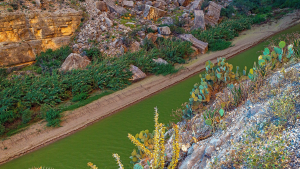Nearly four months after the deadly wildfires, Lahaina’s youngest residents still face displacement, housing insecurity and lingering trauma
When the destructive summer blaze swept across Lahaina, in west Maui, Maryann Kobatake’s nephew helped ferry a friend’s grandmother and cousins to safety. On the drive out of a burning Front Street, the town’s main thoroughfare, she said the 18-year-old heard screams and witnessed carnage that haunts him still.
He has not discussed what he’s seen with her or other family members. “I don’t think he wants to relive it by talking,” she said, adding that she’s tried to get him to open up to her. “Because he’s had it tough in life, I think that’s just how he copes with it.”
Kobatake, who is Native Hawaiian, said she’s worried that her nephew’s habit of suppressing his emotions may leave him unprepared to navigate PTSD symptoms and triggers, especially given that, every day, he has to drive by the ravaged town on his way to school.
The 8 August wildfire that devastated the centuries-old town was the deadliest in modern US history, killing 100 people and displacing 11,000. The blaze reduced Front Street’s brightly painted wooden storefronts, cultural institutions and mid-century homes to block upon block of rubble and charred palm trees. Survivors evoked Pompeii in describing scenes of melting cars and bodies in trees. The trauma of seeing homes turned to ash, and the stress of shuffling among temporary living arrangements, carries serious mental health implications for children and adolescents, who process grief more acutely than adults.
‘Every single person is going to need help’
Since schools in Lahaina reopened in mid-October, the Maui county certified community behavioral health clinic – the only remaining federally funded behavioral health site in Lahaina – has seen an influx of parents seeking counseling and psychotherapy for their children. Instability, loss and fear of the unknown are the greatest challenges children are confronting post-fire, the long-term impact of which could include depression, anxiety and increased risk of substance abuse, said John Oliver, the clinic’s director.
In Lahaina, parents and children are grieving together. “If a child loses someone in a different situation, the parents can be a pillar of support,” he said. “But right now they’re grieving alongside their kids too.”
After losing their homes three months ago, Kobatake’s nephew – a high school football player – is one of three teenage boys staying with Kobatake and her husband at their temporary home, a two-bedroom vacation rental arranged by the Red Cross sheltering program. She also looks after her son, also 18, and a younger nephew, she said, as they adjust to their new reality, sharing donated clothes, food and water from family-run distribution hubs.
Kobatake said the trio of teenagers have firmly bottled up their feelings since the tragedy; not once have they openly grieved, lashed out or reacted emotionally. As with many boys their age, she said, they may take crying to be a sign of weakness, but she’s convinced the valve will burst sooner or later. “If nothing triggers a reaction for them to cry,” she said, “it’s going to happen during their graduation next year.”
In September, Kobatake said, she declined counseling service from a Red Cross volunteer – and not because she wasn’t struggling with what had happened. She has suffered from bouts of insomnia and grief over belongings lost in the flames, such as her children’s baby photos and schoolwork from kindergarten. She left her job as a Safeway manager near the resorts, she said, because her capacity for customer service has “gone out the door”. But finding long-term shelter for her family has taken up all her time, and the return of tourism is delaying her ability to heal.
“Eventually, after we find housing and get settled in, every single person is going to need help,” Kobatake said. “There’s a lot of anger, a lot of stress, because we were forced to accommodate these tourists even though we lost everything.”
Nervous about 2024? We can help.
We’re preparing for one of the most consequential news cycles of our lifetimes. Support independent journalism by helping us reach our $1.5m goal.
‘A new normal of moving around’
For Miguel Ceballos, a father of four with deep-set eyes and thick eyebrows, the biggest concern is housing insecurity. Since the fire, which destroyed their three-bedroom rental apartment, Ceballos, his wife and their children have been displaced seven more times under the Red Cross sheltering program. Their room assignments, in various resorts across west Maui, rarely accommodated six people. Ceballos said his family was once placed in a one-bedroom unit where they had to take turns sleeping atop couch cushions on the floor; another unit didn’t have a kitchen where he could cook the meals his children craved.
The moves affected his children differently, Ceballos said. His youngest son, age five, lost interest in school and refused to wake up in the morning; his formerly buoyant older daughter, 13, became sad and withdrawn. A family counselor with Catholic Charities Hawaii has been exceptionally useful, Ceballos said, in helping him communicate with his children. “I’m learning to let them know I’m mourning and hurting as well so they don’t bottle it up,” he said. “It’s so important not only for the children but also us.”
Ceballos and his wife came up with some solutions of their own: they instructed their children not to unpack their suitcases after each move so they wouldn’t become attached to the place. “We tell them, ‘We’re on an adventure,’” he said, adding that the family has created a routine of watching the sunset and going sightseeing together. “We don’t know when the next one’s gonna come, but we’re going and we’re going to find new things.”
Skye Horie, a licensed marriage and family therapist at the clinic Play Therapy Maui, said that adjusting to “a new normal of moving around” can be particularly traumatizing for young people. “Until they have more permanent housing, there will be that ongoing stress of not feeling safe and settled,” she said.
To model healthy coping behaviors, Horie encourages parents to share with their children their own thoughts and feelings about the fire, including what went wrong and what could have been done differently. “If parents are avoiding talking about it, of course kids will do the same thing,” she said.
There are many obstacles to residents getting the help they need. A long-standing distrust of the government, given the history of colonization and neglect, and the decision to prioritize the return of tourism over long-term housing for survivors, has prevented people from seeking available care, practitioners say. Oliver, of the behavioral health clinic, said some patients expressed frustration with having to repeatedly check in with the Federal Emergency Management Agency (Fema) and the Red Cross to continue receiving benefits. They’re also skeptical about dealing with a changing cast of government workers “who don’t know the island”, he said.
Other barriers include medical bills and a lack of transportation to and from services. Having easy access to care and a “one-stop shop” treatment team is pivotal, Oliver said, because people are so focused on surviving that they might not have the capacity to navigate bureaucratic healthcare obstacles. “People need more transparency in what is happening to them because everything feels so out of control,’” he said.
Ceballos said he wants to secure a permanent home for his children before the holiday season, but said finding an affordable rental apartment in west Maui is like searching for a “needle in a haystack”. The market rent for a three-bedroom unit is at least $7,000, more than twice what he had been paying for their last apartment. That figure was unthinkable even before he lost his job at Ono Gelato Company, which suffered extensive damage from the fire.
Facing the enormity of what he’s lost, Ceballos is still hopeful. In late September, seven weeks after the fire, he and his wife returned to their burned apartment to look for remains of the life they’d built. Sifting through heaps of ash and rubble, they found, undamaged, a heart-shaped memorial glass engraved with the name of their fifth child, who died years ago. “Things that remind us of where we come from also reminds us that we will overcome,” Ceballos said.
This story is part of a series on the aftermath of the Maui wildfires




